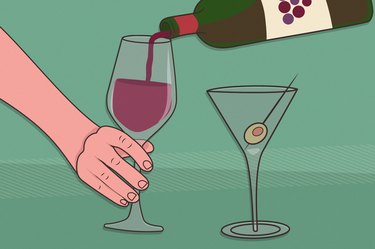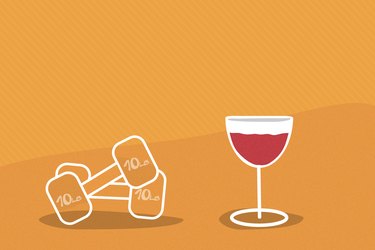
There are a couple of old adages that many drinkers know: "Beer before liquor, never been sicker. Liquor before beer, you're in the clear," is one of them; "Beer before wine and you'll feel fine" is another.
The rhymes refer to the idea that mixing alcohol is bad, and you'll feel sick or have a hangover if you drink beer before cocktails or wine before beer.
Video of the Day
Video of the Day
If you're wondering if mixing alcohol is bad, good news: There's no conclusive evidence to support that notion, according to Winchester Hospital. Instead, the likelihood of getting sick relates to the total amount of alcohol you drink in one night.
Alcohol Digestion 101
The way your body digests alcohol is different than how it digests food. When you take a sip of a drink— whether beer, wine or liquor — a small amount of alcohol is absorbed directly by your tongue and the lining of your mouth, according to Bowling Green State University (BGSU).
The rest makes its way to your stomach, where it's absorbed into your bloodstream through the tissue in your stomach and small intestine. From there, the bloodstream carries the alcohol to all of the organs in your body, entering all tissues except for bone and fat. Depending on how quickly your body's tissues absorb the alcohol, you'll feel the effect of that alcohol within 15 to 45 minutes of drinking it.
A variety of factors contribute to how alcohol affects your body, per BGSU, including the amount of alcohol taken in. What may cause confusion — and lead to the idea that certain types of alcohol can get you drunk more quickly — is that the same amount of alcohol looks different depending on what type of drink it is.
One standard drink is defined as any beverage containing 0.6 fluid ounces or 14 grams of pure alcohol, according to the National Institute on Alcohol Abuse and Alcoholism. This is equal to:
- 12 fluid ounces of regular beer
- 5 fluid ounces of wine
- 1.5 fluid ounces of distilled spirits
- 8 to 9 fluid ounces of malt liquor
Side Effects of Mixing Drinks
Fortunately, there aren't any side effects specifically related to mixing drinks — meaning that having a glass of wine during happy hour and a beer with dinner should be OK.
In fact, a small February 2019 study in The American Journal of Clinical Nutrition looked at whether drinking wine before beer was associated with hangover severity and found that neither the type nor the order of alcoholic beverage had a significant effect.
But certain types of alcohol are more likely to lead to a hangover than others. For example, you might be more likely to have a hangover if you drink alcohol that contains congeners, a chemical that results from the fermenting process and provides flavor, according to the Mayo Clinic. Darker alcohols, such as brandy, bourbon, darker beer and red wine, have more congeners than clear or lighter alcohols like vodka, gin and lighter beers.
Plus, mixing alcohol can have another effect that you might not expect. "Mixing drinks makes it hard to keep track of how much you have been drinking, which can have negative effects," says Brocha Soloff, RD, CDN. When you're not keeping track of how much you're drinking, you're more likely to drink to too much — and get a hangover because of it.
Excessive drinking — even in one night — can lead to excess empty calories, a hangover, dehydration, poor decision-making and a weakened immune system, says Julie Harrington, RD.
How to Minimize Alcohol's Side Effects
The best way to minimize the side effects of drinking alcohol is to moderate your drinking.
Drink water: Beyond drinking less, Harrington recommends alternating between a glass of water and alcoholic beverages, which can support hydration and help you drink fewer alcoholic beverages in a short period of time.
Eat beforehand: Eating a hearty meal before drinking can reduce the effects of alcohol, whether or not you're mixing drinks. Food both physically obstructs alcohol from coming in contact with your stomach lining and slows the absorption of alcohol, according to BGSU.
Having food in your stomach also prevents alcohol from passing into the duodenum, or the upper part of the small intestine, where there is ample opportunity for it to be absorbed into your bloodstream.
Related Reading
Other Factors That Contribute to Hangovers
While the amount of alcohol you drink plays the biggest role in whether you experience a hangover, other factors can contribute, too.
For example, some people have alcohol intolerance, which is the genetic inability to process acetaldehyde (a byproduct of alcohol) fast enough, according to the Cleveland Clinic. And using other drugs in conjunction with alcohol, including cigarettes, marijuana and cocaine, can cause a worse hangover.
A person's sex may also factor into hangover severity. Women who had moderate to high estimated peak blood alcohol concentrations — 0.08 percent to more than 0.2 percent — reported hangovers with more severe nausea, tiredness, weakness and dizziness than men, per a May 2019 study in the Journal of Clinical Medicine.
The Bottom Line
Despite the legends, mixing alcohol is not really bad — at least when it comes to getting sick or having a hangover.
But, it can be really bad to drink too much at one time, as that's the most likely predictor of if you will get sick or have a terrible hangover the morning after.
- Bowling Green State University: “Alcohol Metabolism”
- Winchester Hospital: “True or False: Mixing Different Types of Alcohol Increases Your Risk of Getting Sick”
- National Institute on Alcohol Abuse and Alcoholism: “What Is a Standard Drink?”
- The American Journal of Clinical Nutrition: "Grape or Grain But Never the Twain? A Randomized Controlled Multiarm Matched-Triplet Crossover Trial of Beer and Wine"
- Mayo Clinic: Hangover Prevention: "Do Lighter Colored Drinks Help?"
- Journal of Clinical Medicine: "Sex Differences in the Presence and Severity of Alcohol Hangover Symptoms"
- Cleveland Clinic: "Hangover"



